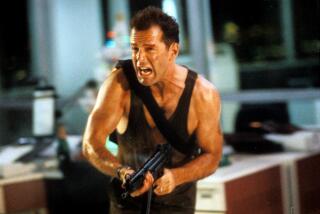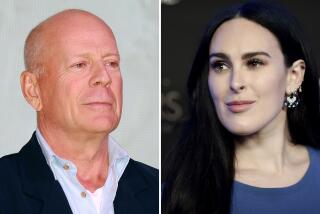MOVIE REVIEW : ‘BURKE & WILLS’: IRONIES AMID THE SPLENDOR
- Share via
On Aug. 20, 1860, Robert O’Hara Burke, an Irish cop, and William John Wills, an English gentleman, set out from Melbourne’s Royal Park with 17 men, 28 horses, 26 camels, 6 wagons and 21 tons of equipment and supplies, to become the first white men to cross Australia south to north.
“Burke & Wills” (at the Avco, Westwood) is a splendidly robust and stirring account of their adventure, which has become part of Australian folklore. “Burke and Wills” has not only all the elements of a “King Solomon’s Mines” but infinitely more, including ironies worthy of the greatest dramatists.
Director Graeme Clifford, a distinguished Sydney-born film editor who made his directorial debut with “Frances,” and writer Michael Thomas perceive in Burke and Wills’ story the very embodiment of the glory and folly of the Victorian age. Along with suspense, danger and hardship (and limitless vistas of desert terrain), there is trenchant commentary on British colonial society and its mores, on the white man’s tragically blind and exploitive view of the black man and on the European’s proud sense of indomitable superiority--at its crest in the 19th Century and at once his goad and his downfall. So all-encompassing and comprehending is “Burke and Will’s” view of human nature that it is simultaneously an impeccable period piece and a saga with the timelessness of “The Iliad” or “The Odyssey.” As if all this weren’t enough, it also boasts a grand romance.
Jack Thompson’s rugged, full-bearded Burke, fired by his brother’s heroism in the Crimean War, views the trek as the opportunity to achieve sufficient glory to make him a socially acceptable husband to tempestuous opera star Julia Matthews (Greta Scacchi). She is his not-so-secret lover, a beautiful woman as courageous as she is coquettish.
In contrast, Nigel Havers’ slim, aristocratic Wills is a calm, Charles Darwin type, interested in recording all that he observes of the stark, uncharted wasteland. Even though Wills possesses great strength of character beneath his gentle demeanor, Burke is clearly the leader of the expedition, a man whose Christian sense of duty toward a fallen comrade proves as dangerous as his racist views of the aboriginals. In a film of uniformly fine performances, Thompson, the Australian cinema’s definitive bloke, is towering, a King Lear of the outback.
Even more pivotal to the expedition than Burke’s contradictory nature is its key backer, Ambrose Kyte (Hugh Keays Byrne), a nouveau-riche land-grabber whose interest wanes when a rival explorer, John McDouall Stuart, drops out of what Kyte sees narrowly as a cross-country race. (Kyte also deludes himself that, although married, he’ll have a chance at Julia with Burke off charting unknown territory.)
“Burke and Wills” has been made in the time-honored traditional style of the beautifully crafted British empire epic, but from the colonial’s wary, down-to-earth point of view. (Interestingly, Clifford and Thomas do not present Wills as in any way condescending to Burke; their Wills is a smart man, well aware of his leader’s strengths and weaknesses.)
Perhaps only a cinema as young as Australia’s could get by with such a straight-arrow, heart-on-its-sleeve approach; an equivalent American film might well seem merely old-fashioned rather than fresh, vital and involving. “We’ll give them a show they won’t forget,” promised Burke upon the triumphant return he so rapturously envisioned. In “Burke and Wills” (rated an appropriate PG-13 for some sequences too intense for the very young) Clifford, Thomas and their associates have given us a show we’re not likely to forget.
‘BURKE & WILLS’
A Hemdale release of a Hoyts Edgley production. Executive producers Terry Jackman, Michael Edgley. Producers Graeme Clifford, John Sexton. Director Clifford. Screenplay Michael Thomas. Camera Russell Boyd. Music Peter Sculthorpe. Production designer Ross Major. Costumes George Liddle. Film editor Tim Wellburn. With Jack Thompson, Nigel Havers, Greta Scacchi, Matthew Farger, Ralph Cotterill, Drew Forsythe, Chris Haywood, Monroe Reimers, Ron Blanchard, Barry Hill, Roderick Williams, Hugh Keays Byrne, Arthur Dignam, Julia Hamilton.
Running time: 2 hours, 20 minutes.
MPAA rating: PG-13 (parents are strongly cautioned; some material may be inappropriate for children under 13).
More to Read
Only good movies
Get the Indie Focus newsletter, Mark Olsen's weekly guide to the world of cinema.
You may occasionally receive promotional content from the Los Angeles Times.










